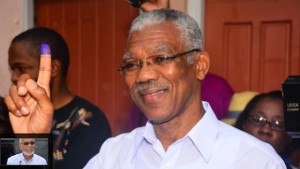
GRANGER… Guyana reposes its faith and places its fate in the international system of peace that was promised by the Charter of the United Nations 70 years ago.
UNITED NATIONS (CMC) President David Granger took his country’s border dispute with Venezuela to the international community, urging the United Nations General Assembly (UNGA) to do more than just monitor conflicts that affect small states like Guyana.
“Guyana calls upon the United Nations to give real meaning to Resolution A/RES/49/31 of May 9th 1994 by establishing a collective security system not merely to ‘monitor, but, more so, maintain the security of small states’, Granger said in his maiden address to the world body, adding “this Resolution is a ‘manifesto’ of small states security.”
Granger, who came to power earlier this year and met with Venezuelan President Nicolas Maduro on Sunday night in the presence of UN Secretary General Ban Ki-moon, said that the United Nations remains the Caribbean Community’s (Caricom) best hope for dealing with the situation.
“The United Nations is our best prospect of peace. The United Nations is our best assurance of security for a small state. The United Nations is our strength, support and succour in our time of danger. We pledge Guyana’s adherence to the Charter of the United Nations.
“Guyana reposes its faith and places its fate in the international system of peace that was promised by the Charter of the United Nations 70 years ago. We want to bring an end to Venezuelan aggression. We want to develop our country, all of our country, in accordance with international law”,” he said.
Venezuela President Nicolas Maduro in May issued a Decree that included all the Atlantic waters off the Essequibo Coast.
The purported annexation of the waters off Essequibo now takes in the oil-rich Stabroek Block, where American oil giant Exxon Mobil in May found a “significant” reserve of high quality crude oil.
ExxonMobil said the discovery was made in one of the two wells it dug, in the Liza-1 drill site, which realised more than 295 feet of high-quality oil-bearing sandstone.
Granger told the UNGA that as a small state, Guyana, for the past 50 years has been prevented from fully exploiting its rich natural resources and that Venezuela has threatened and deterred investors and frustrated its economic development
“For 50 years Venezuela has promulgated spurious decrees claiming our territory, the most recent being on May 26th, 2015, our Independence anniversary, when it issued Decree No 1.787 with specified coordinates purporting to annex almost our entire maritime zone. That decree constituted a reassertion of its claim to five of Guyana’s ten regions,” President Granger said.
Granger said that Georgetown ejects the threats and claims by Venezuela, which are in defiance of international law.
“Guyana resists Venezuela’s acts of aggression in defiance of the Charter of the United Nations, which prescribes the peaceful settlement of disputes and proscribes the use of armed force,” he said, insisting that the border dispute with Venezuela was settled 116 years ago that only Caracas does not accept.
“Venezuela’s expansionist ambitions cannot be allowed to unsettle the principle of inviolability of borders, undermine the tenets of international law and unravel borders which have been undisturbed for decades,” he said, adding that Guyana has the fullest confidence in the judgement and capacity of the United Nations, through the Office of the Secretary General to identify solutions that will validate the ‘just, perfect and final’ nature of the award.
“We thank the United Nations and the secretary general for appointing various good officers to help to resolve this controversy over the past 25 years. We feel that this process has now been exhausted.
“Guyana does not wish that this obnoxious territorial claim should obscure the prospects of peace and obstruct the possibility of growth for the next 50 years,” he said, adding that Guyana needs a permanent solution in order to “avoid the fate of perpetual peril and penury”, maintaining that Guyana seeks a juridical settlement to the controversy.
Meanwhile, the Commonwealth Ministerial Group said it stands behind Guyana in its border dispute.
The Group’s position was outlined following a meeting at the request of Guyana and chaired by Jamaica’s Foreign Minister A J Nicholson.
The Commonwealth Ministerial Group said it was reiterating its “unequivocal and collective support of Commonwealth member governments for the maintenance and preservation of Guyana’s sovereignty and territorial borders, in accordance with the 1899 Arbitral Award, the upholding of the rule of international law, and the resolution of conflict and differences by peaceful means”.
The group received with serious concern reports from Guyana regarding recent military activities of Venezuela along the border between the two countries and within the established marine areas of Guyana, leading to heightened tensions at the border.
The Commonwealth Group said it had also noted and commended the statements issued by the Commonwealth Secretary-General on June 27, 2015, and by Carisom Heads of Government on July 7, 2015.
